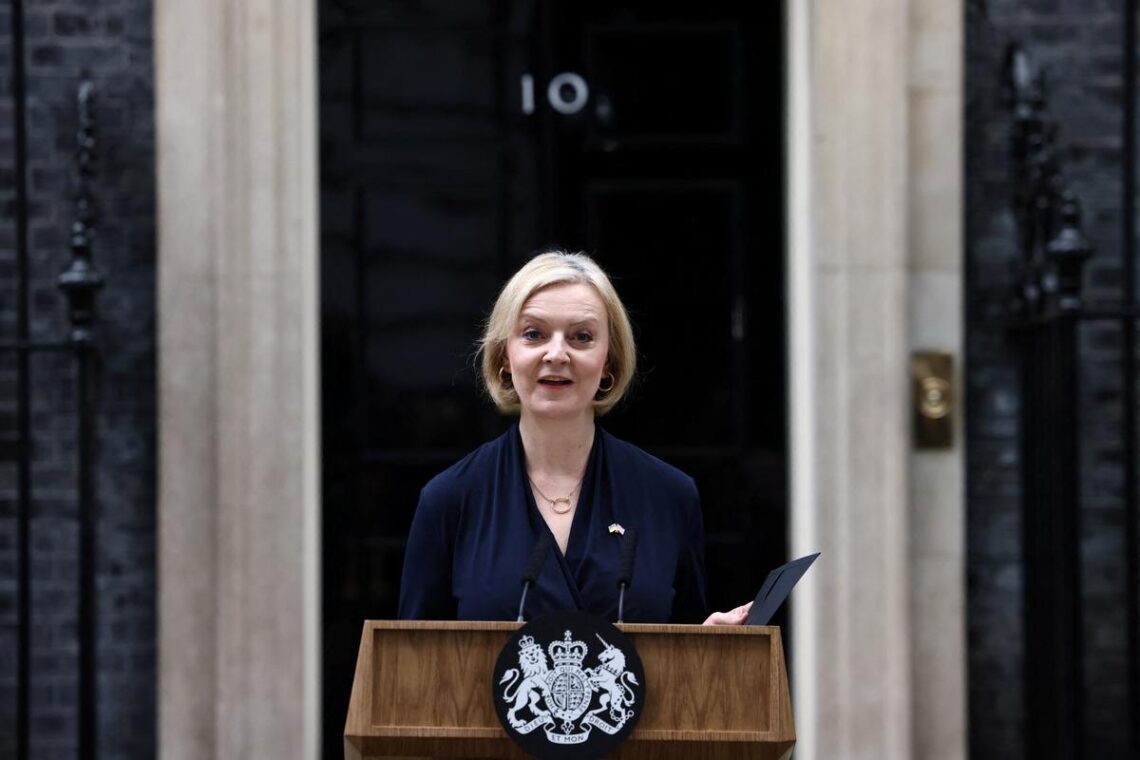[ad_1]
After the announcement, Labour leader Keir Starmer demanded an immediate general election.
After the announcement, Labour leader Keir Starmer demanded an immediate general election.
British Prime Minister Liz Truss on October 20 dramatically announced her resignation just six weeks after taking office.
Ms. Truss bowed to the inevitable after her right-wing platform of tax cuts disintegrated and as many MPs among the ruling Conservatives revolted.
Speaking in Downing Street, Ms. Truss said she would stay on as Prime Minister until a successor is chosen to serve as Tory leader.
“We’ve agreed that there will be a leadership election to be completed within the next week,” she said, after senior backbench MP Graham Brady told her the game was up.
“This will ensure that we remain on a path to deliver our fiscal plan and maintain our country’s economic stability and national security,” she added.
The contest to replace Ms. Truss should be concluded by October 28, Mr. Brady said.
“It will be possible to conduct a ballot and conclude a leadership election by Friday the 28th of October. So we should have a new leader in place before the fiscal statement which will take place on (October) the 31st,” he added.
Keir Starmer demands general election ‘now’
After the announcement, U.K. Labour leader Keir Starmer demanded an immediate general election.
The end for Ms. Truss came after a key minister resigned and many Tory MPs rebelled over an important vote in chaotic scenes at the House of Commons late Wednesday.
By Thursday morning, more than a dozen Conservative MPs had publicly urged Ms. Truss to resign, after her tax-cutting plans caused a market meltdown during an already severe cost-of-living crisis.
Many more were reported to have submitted letters to Mr. Brady calling for her to be removed, although party rules would have forbidden another leadership campaign for 12 months.
“The prime minister acknowledges yesterday was a difficult day and she recognises the public wanted to see the government focusing less on politics and more on delivering their priorities,” her official spokesman told reporters.
Barely two hours later, she quit.
Events reached a head after what right-wing tabloid The Sun called “a day of extraordinary mayhem” on Wednesday.
Interior minister Suella Braverman left, apparently at Truss’s demand after she sent a government document in a personal email.
But Braverman, an arch right-winger who enjoys strong support among the Tory membership, used her resignation message to attack Truss in blistering terms.
There then followed farcical scenes in parliament as many Tory MPs rebelled against the government’s demand that they drop the party’s manifesto commitment to maintain a ban on fracking.
Clinging to power
Accusations swirled of heavy-handed efforts to whip MPs into line, some of whom later briefed the media that it was the nail in the coffin of the Truss premiership.
Conservative lord Ed Vaizey said the “only way out of this mess is for Liz Truss to stand down and for somebody to be appointed as prime minister by Conservative MPs”.
Now, the party can avoid a lengthy leadership contest by consolidating around a unity candidate for her replacement.
Ms. Truss beat former finance minister Rishi Sunak in the leadership race after Boris Johnson announced his resignation in July—but Johnson supporters have vowed to block a coronation for Mr. Sunak now.
“It’s time for the prime minister to go,” lawmaker Miriam Cates said. Another, Steve Double, said of Truss: “She isn’t up to the job, sadly.” Legislator Ruth Edwards said “it is not responsible for the party to allow her to remain in power.”
PM booed
Ms. Braverman’s resignation message came hours after Ms. Truss sought to dispel doubts over her leadership with a combative appearance in parliament.
Ms. Truss faced harsh putdowns from Labour’s Starmer as she took part in her first Prime Minister’s Questions since the budget U-turns.
Mr. Starmer asked the House of Commons: “What’s the point of a prime minister whose promises don’t even last a week?”, as opposition MPs jeered and booed Truss, and her own party’s MPs remained silent.
World leaders react to Truss resignation
French President Emmanuel Macron said it was important that Britain Kingdom found “stability as soon as possible”, as he commented on the resignation of British Prime Minister Liz Truss.
“We want, above all else, stability,” Mr. Macron told reporters as he arrived at a European Union summit in Brussels.
“On a personal level, I am always sad to see a colleague go,” he added.
Russia’s foreign ministry welcomed the departure of British Prime Minister Liz Truss, saying she was a disgrace of a leader who would be remembered for her “catastrophic illiteracy”.
“Britain has never known such a disgrace of a prime minister,” Foreign Ministry Spokeswoman Maria Zakharova said.
The claim of illiteracy appears to refer to Truss’ visit to Moscow shortly before Russia invaded Ukraine while she was British foreign minister.
In a meeting with Russia’s veteran foreign minister, Sergei Lavrov, she appeared to confuse two regions of Russia with Ukraine, triggering mockery by the Russian diplomat and across talk shows on Russian state TV.
The United States will have a close relationship with whomever replaces outgoing British Prime Minister Liz Truss after she announced her resignation on Thursday, White House Chief of Staff Ron Klain said.
U.K. stocks rally
UK’s main stocks indexes hit session highs before paring gains on Thursday after Liz Truss said she was resigning as Prime Minister, brought down by her economic programme that sent shockwaves through the financial markets.
The blue-chip FTSE 100 gained as much as 0.4% but quickly erased the gains and was last down 0.1% as the pound rose 0.3%.
The battered FTSE 250 index, more exposed to the domestic economy, gained 0.4% after jumping as much as 1% earlier.
[ad_2]
Source












